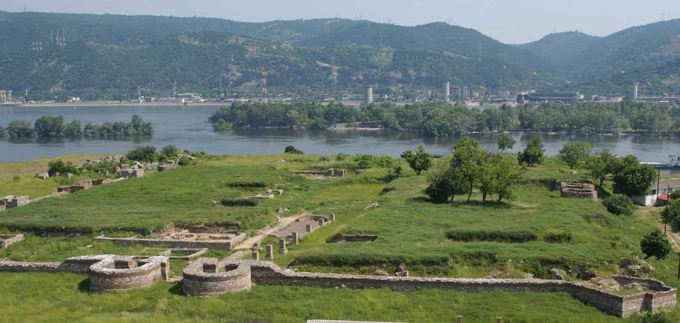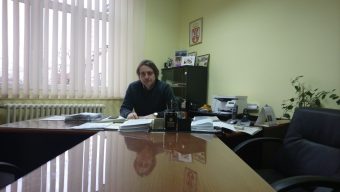
Kladovo municipality is one of the four municipalities in the Bor district, with enormous cultural and historical heritage and natural resources. Kladovo has used its potential to attract tourists and investors in the field of sustainable development. we talked to Jovan Stingic, the Head of municipal administration, about the ecological and other achievements of Kladovo residents, the economic progress of the municipality and tourism development.
EP: According to the announcements from the Ministry of Agriculture, in early 2018 first calls for proposals for financial grants from the pre-accession funds of the European Union for Rural Development (IPARD) will be announced, which are primarily intended for investments in equipment and machinery for the manufacturing industry and primary production. Since domestic farmers generally do not have information regarding available resources nor are familiar with the project development at the local level, do you plan to provide some kind of system support, inform them or possibly train potential users of the IPARD funds that could help the development of the municipality?
Jovan Stingic: Although our farmers were eagerly awaiting the IPARD program, a difficulty arose with their limited absorptive capacities to use the funds. Given the previous experience of our society in the process of joining the European Union, the phenomenon is also to be expected. it is unrealistic to consider that our farmers will be prepared for the use of IPARD in the period when it was mentioned as something that is still ahead of us.
The responsibility for the program implementation lies with the Ministry of Agriculture, which should define the institutional frameworks for providing assistance to our farmers in the utilization of funds. The principle of operation in the municipal administration of Kladovo is to act as the citizen support and, when we notice that there is some gap in the system or lack of logic in the prescribed procedures for exercising some rights or interests of the citizens, we find a way to eliminate the deficiencies and make it easier for the citizens to exercise their rights and interests.
In cooperation with the agricultural advisory service from Negotin, we organized a meeting where experts filled our farmers in on the conditions and procedures for the fund’s implementation. The officials in Kladovo municipal administration in charge of agricultural affairs have also been sent on educational courses because they are the first representatives of the government that the farmers, who are interested in the program, make contact with. As an intermediary in establishing contact and creating the connection between reliable consulting organizations in Serbia and Kladovo farmers, our goal is to bring the IPARD meaning closer to the interested parties. The field that is currently a closed book to farmers opens the possibility of maneuvering and providing unprofessional services that we strive to put an end to.
If through close monitoring of the program implementation in our municipality we notice the effectiveness of the local administration, we will be ready to provide further assistance to the citizens.
EP: Kladovo is often called a green municipality. What would you highlight as the main advantages of your city, due to which this unofficial title was obtained?
Jovan Stingic: The phrase “Kladovo – green municipality” has a double meaning. The first refers to natural resources and the environment. One-third of the national park “Djerdap”, which is the largest one in Serbia, is located in our municipality. 92 kilometers of river Danube flows through Kladovo, and that part is what we consider, though immodestly, the most beautiful. There are many other sites of exceptional natural beauty, for example, the Miroc Mountain and the Blederija waterfalls.
The second meaning of the phrase refers to the production of electricity from renewable resources. The hydropower plant “Djerdap”, which has been producing more than 20 percent of Serbian electricity for nearly 50 years, uses the Danube’s power. In the last couple of years, it was joined by the solar power plant “Solaris”.

EP: The first solar power plant in private ownership of “Solaris Energy” company is evidence that the municipality continues the tradition of investing in “green” energy, which was first established with the construction of the largest hydroelectric power plant Djerdap. Has there been an increase in interest for investments in renewable energy from the companies in this region, and how is the municipality planning to attract new investors?
Jovan Stingic: We immediately noticed the great interest of the Kladovo municipality to implement this project on our territory. We were the first issuers of a solar power plant building permit in the Republic of Serbia. Since we were moving through a path no one had ever paved before us, the construction was not an easy task. The project financiers themselves helped us a lot to successfully execute this job. Everyone in Kladovo municipality is extremely proud of the successfully executed „Solaris” power plant project.
In such complex tasks, the local self-government also needs to help the potential investor in relations with representatives of other levels of government, so we have often been in contact with local distribution, fire police, and cadastre, who were also part of the team that helped in the realization of the construction.
When you ask me what the municipality does to attract donors, whether, from Kladovo or some other city, the answer is the maximum help to realize their planned investments. The financiers of the solar power plant have shared their positive experience, so we have obtained the best kind of marketing, in the spirit of our proverb that good news travels fast.
EP: How much is tourism developed in Kladovo, what are the accommodation capacities, and what is the annual number of visitors?
Jovan Stingic: Tourism is the economic sector that dominates the entire Kladovo economy. Hotels “Djerdap” and “Aqvastar Danube” have a key role in tourism development investing significant resources for improving the tourist offer in Kladovo.
In the last three years, the largest amount of money invested in tourism in our municipality was done by the Institute of Sport and Sports Medicine, which invests in the tourist village “Karatas” in order to become a national training center.
The annual number of visits, according to official data, is more than 50 thousand overnight stays. However, we believe that this number is even higher because there are many people who stay in private accommodation. As the last few years resulted in the expansion of this type of accommodation, many Kladovo residents are offering their apartments and houses which they turned into tourist apartments.
EP: What are the main tourist attractions and are there plans to organize some additional festivals, considering that, for example, the ethno-festival is exceptionally visited with a record number of 5.000 guests in 2017 coming only from Romania?
Jovan Stingic: The hydroelectric power plant “Djerdap 1” has been the most attractive tourist destination in Kladovo for the last five decades. The National Park is also important, as are many cultural and historical monuments that originate from different periods, from the first century AD to the modern times. I’m primarily referring to the legacy of the Roman Empire which is located on municipality’s territory: Trajan’s tablet, Trajan’s Bridge, the fortress “Diana”. I must admit that the accessibility of these and other cultural and historical monuments is limited and some of them are neglected. The responsibility for this lies with the Municipality and the Republic. For several years now, Kladovo has had the complete project and technical documentation for the reconstruction and rehabilitation of the “Fetislam” Fortress prepared but does not have the necessary funds.
Ethno-festival is a tourist event with a 12-year tradition which attracts a large number of guests. Lately, there is a very strong visiting trend from our neighbours from Romania, not only during the Ethno festival but throughout the year. Romanians are coming in such a great number that it can be said that they are the dominant guests in Kladovo bars and represent the main market for Kladovo hospitality industry.
EP: What are further plans for the development of the municipality for 2018 and what will be the primary focus of the management?

Jovan Stingic: In 2018 the municipality of Kladovo is planning significant investments in public infrastructure. We have agreed on the following tactics: in the first half of the year, we will invest the funds in the development of the project and technical documentation, and in the second half we will announce the calls for tenders for contractors and start with construction works.
We have already started with the reconstruction of Kladovo primary school which is 1.1 million euros worth. The repair of the bridge damaged by floods in Velika Kamenica is also in progress. We also announced a public procurement for development of the project and technical documentation for the reconstruction and adaptation of the health center in Kladovo. We believe that this will be a historic job. The financier will be the Public Investment Management Office, and several millions of euros will be invested. We are also planning to develop the project-technical documentation for the aqua park or swimming pool, depending on what the feasibility study proves to be more appropriate.
EP: We know that the Implementation Agreement of the “Heritage on the Danube border” project was signed, which is co-financed by the European Union within the framework of the cross-border cooperation between Romania and Serbia from the IPA funds in the amount of 1.3 million euros. Kladovo Municipality is the leading partner on this project. What is planned to be implemented in the municipality from these funds?
Jovan Stingic: The project “Heritage on the Danube border” envisages the construction of the visitor center in the fortress “Fetislam” whose estimated value is 940 thousand euros. At the end of February, the tender procedure was completed. We expect that with the beginning of the construction season will also begin the work on the construction of this facility.
Among other project activities, we can distinguish the research and recording of the cultural heritage and customs in our region and in neighboring Romania, for that purpose we created the teams which have a task to gather as much material as possible and make audio and video recordings.
Interview by: Jelena Kozbasic
This interview was published in the new issue of the Energy portal Magazine on SUSTAINABLE DEVELOPMENT, March 2018



